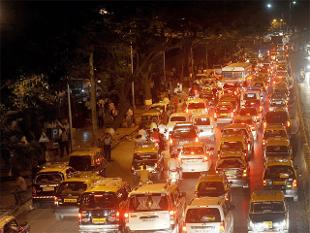Air quality has worsened in several cities, including Mumbai, Delhi, and regions in northern India, reaching severe levels. The deteriorating air quality has raised concerns over various health risks. The advisory also highlights the heightened risk of air pollution for vulnerable populations, such as children, pregnant women, the elderly, individuals with pre-existing conditions, and workers exposed to pollution
New Delhi: The Union Health Secretary issued an updated advisory on Monday to states and union territories regarding air pollution.
The advisory includes recommendations for states and UTs to strengthen existing health systems and raise awareness among vulnerable groups and at-risk occupations.
The advisory suggests developing detailed action plans at the district and city levels to address climate change’s health impacts, including strategies to combat air pollution.
It also emphasises expanding the network of sentinel hospitals to monitor air pollution-related illnesses within each state or union territory for effective response and monitoring.
The statement outlines a strategy for health departments and healthcare facilities to better prepare for the impacts of air pollution by increasing public awareness through targeted messaging in regional languages across various media channels, educating healthcare workers on air pollution-related health issues, and actively monitoring air pollution-related diseases through sentinel surveillance systems under the National Programme on Climate Change and Human Health (NPCCHH).
The advisory also highlights the heightened risk of air pollution for vulnerable populations, such as children, pregnant women, the elderly, individuals with pre-existing conditions, and workers exposed to pollution.
Air quality has worsened in several cities, including Mumbai, Delhi, and regions in northern India, reaching severe levels. The deteriorating air quality has raised concerns over various health risks.
Meanwhile, in the national capital, the Supreme Court on Monday directed Delhi and all governments in the National Capital Region (NCR) to strictly implement GRAP Stage IV anti-pollution measures, as the Air Quality Index (AQI) remains in the “severe” category.
A bench comprising Justices Abhay S. Oka and Augustine George Masih also directed Delhi-NCR states to immediately form teams to monitor actions required under the plan.
The court further ordered the continuation of GRAP Stage IV measures even if the AQI falls below 450 and instructed all NCR states and the central government to file compliance affidavits.
Amid alarmingly high pollution levels in Delhi, Environment Minister Gopal Rai on Tuesday urged the Centre to convene an emergency meeting to tackle the issue and said it is the moral responsibility of Prime Minister Narendra Modi to intervene in the matter.
Addressing a press conference, Rai said the Centre has not acted on the Delhi government’s repeated requests to allow artificial rain in the national capital and he will again write to Union Environment Minister Bhupender Yadav.
“Delhi is under GRAP (Graded Response Action Plan) Stage IV restrictions, and we are taking every possible step to reduce vehicular and industrial pollution. Restrictions have been imposed on private vehicles and trucks, aiming to curb the number of vehicles entering the city.
“We are consulting specialists to explore measures to reduce the smog. One of the solutions under consideration is artificial rain, which can help settle pollutants and clear the air,” Rai said.
The Union environment minister has not responded to repeated requests from the Delhi government to call an emergency meeting over the dire pollution situation in the city and allowing artificial rain, he said.
“If the central government cannot act, then their (environment) minister should resign,” he added.
He said he is drafting another letter to Yadav urging him to call the emergency meeting.
“The Delhi government is prepared to work alongside the central government, but the Centre must take the lead by convening a meeting involving experts from IIT Kanpur who have conducted extensive research on artificial rain. This requires permission and collaboration from various central departments,” he said.
Rai said the GRAP should be implemented across north India and accused BJP-led states of violating the rules.
“GRAP-IV will remain in force if pollution persists, we will not give any relaxation, the minister said.

